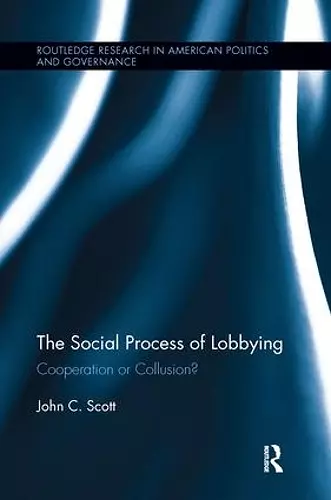The Social Process of Lobbying
Cooperation or Collusion?
Format:Paperback
Publisher:Taylor & Francis Ltd
Published:18th Nov '16
Currently unavailable, and unfortunately no date known when it will be back
This paperback is available in another edition too:
- Hardback£94.99(9780415727174)

Despite a wealth of theorizing and research about each concept, lobbying and norms still raise a number of interesting issues. Why do lobbyists and politicians engage in cooperative behavior? How does cooperative behavior in lobbying affect policy making? If democratic participation is good, why do we view lobbying as bad?
Lobbying engenders debate about its effects on the political process and on policy development. Sociologists and other social scientists remain concerned about how norms emerge, the content of norms, how widely they are distributed, and how they are enforced. Political scientists study how interest groups work together and influence the political process. Based on the experience of the author, a former lobbyist, this book looks at the social norms of lobbying and how such norms work in a general framework of other norms and legal institutions in the political process. In developing this argument, John C. Scott claims that:
- Embedded social relationships and trust-based social norms underpin everyday interactions among policy actors.
- These relationships and norms have concrete impacts on the policy making process.
- Social relationships and norms inhibit participation in the political process by outside actors.
The investigation is conducted through an innovative theoretical framework, combining existing theoretical perspectives from different disciplines, and using a variety of data and methods, including longitudinal quantitative and social network data, interviews with lobbyists, activists, and policymakers, and anecdotal and historical examples.
The Social Process of Lobbying provides refreshingly new empirical evidence and theoretical analysis on how networks of trust are neither all good nor all bad but are ambivalent: they can both improve policy and fuel collusion.
"Why do government decision-makers listen to lobbyists, especially when they are held in such low esteem by the public? This is the question at the center of this new and provocative book by John C. Scott, a professor of political science and former lobbyist. In answering this question, Dr. Scott focuses on social norms and informal contacts between lobbyists and policymakers and between lobbyists themselves. Dr. Scott makes a compelling case that lobbying cannot be fully understood unless we more carefully consider the ways that lobbyists and policymakers interact outside formal political channels. While many academic treatments acknowledge that lobbying is an inherently social process, few studies tell us what this process actually looks like. Dr. Scott tells us not only what the lobbying process looks like, but also tells us why it looks the way it does."—Anthony J. Nownes, University of Tennessee, Knoxville, USA, CHOICE recommended
"John Scott’s Social Process of Lobbying is valuable for the distinct sociological perspective it offers on how influence peddling takes place. Using creative and original data sources, the book uncovers the exchange processes at work in lobbying, and does so in a fashion that tells a big-picture story without sacrificing nuance. This is highly rewarding reading for political scientists, sociologists, and scholars of political communication, not to mention those with particular interests in retirement and Medicaid policy."—Edward Walker, UCLA.
"Why do government decision-makers listen to lobbyists, especially when they are held in such low esteem by the public? This is the question at the center of this new and provocative book by John C. Scott, a professor of political science and former lobbyist. In answering this question, Dr. Scott focuses on social norms and informal contacts between lobbyists and policymakers and between lobbyists themselves. Dr. Scott makes a compelling case that lobbying cannot be fully understood unless we more carefully consider the ways that lobbyists and policymakers interact outside formal political channels. While many academic treatments acknowledge that lobbying is an inherently social process, few studies tell us what this process actually looks like. Dr. Scott tells us not only what the lobbying process looks like, but also tells us why it looks the way it does."—Anthony J. Nownes, University of Tennessee, Knoxville, US, CHOICE recommended
"John Scott’s Social Process of Lobbying is valuable for the distinct sociological perspective it offers on how influence peddling takes place. Using creative and original data sources, the book uncovers the exchange processes at work in lobbying, and does so in a fashion that tells a big-picture story without sacrificing nuance. This is highly rewarding reading for political scientists, sociologists, and scholars of political communication, not to mention those with particular interests in retirement and Medicaid policy."—Edward Walker, UCLA.
ISBN: 9781138287341
Dimensions: unknown
Weight: 453g
212 pages